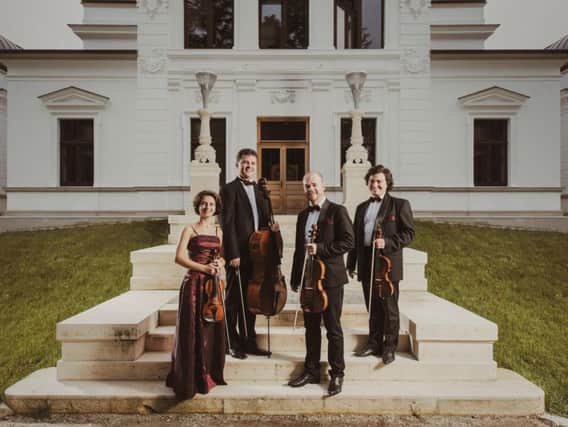REVIEW: Arcadia String Quartet, Chichester


They last visited Chichester in 2013 shortly after winning the Wigmore Hall International String Quartet Competition and their return visit was eagerly anticipated. The anticipation was not misplaced.
They opened their concert with the String Quartet in E Op. 33 no 2 by Haydn. It was a performance of lightness and delicacy admirably led by first violin Ana Török. The Arcadia’s command of the music was evident from the first bar through to the delightful finish. The quartet, one of the so-called Russian quartets written in 1781, acquired the nickname The Joke because of its false ending, leading the audience to believe the quartet has finished before it actually has. Pre-warned by the programme notes, the Chichester audience did not fall for the deception.
Advertisement
Hide AdAdvertisement
Hide AdThe second, and more substantial, item on the Arcadia’s programme was the second String Quartet in D major by Alexander Borodin. This gorgeously romantic work is an expression of serene happiness and the sheer joy of being alive. Borodin’s biographer, Sergey Dianin, has suggested that the whole quartet is based on the happiness of Borodin’s marriage to his wife Ekatrina and is, in effect, an extended love letter. It received an affectionate and compelling performance. It opens with a cello statement, played rather briskly by cellist Zsolt Török, and taken up by the first violin. The second subject, played with great delicacy by Ana Török over a pizzicato accompaniment, was a delight. The best known movement, the heart-stoppingly exquisite Notturno, was beautifully crafted. It begins with an Andante introduced by the cello over syncopated chords on the second violin and viola answered by the first violin in a high register. Ana Török’s floated violin entry was sublime. The second subject, marked appassionato e risoluto, entrusted to the second violin of Rasvan Dumitru, was also beautifully played. The final movement, after the opening few Andante bars, was set off at a brisk pace by viola player Traian Boala and was suitably energetic and dramatic.
After an interval, the Arcadia Quartet returned to play something altogether more gritty and problematic, the 8th Quartet of Dmitri Shostakovich in C minor Op.110. The quartet was written in the space of three days in 1960 in Dresden where the composer had gone for treatment for polio. The city still lay in ruins from the bombing raids of February 1945 and Shostakovich dedicated the quartet to victims of fascism and war, including victims of brutality in his own country. According to his daughter Galina, Shostakovich saw himself as being a victim and the quartet contains frequent eruptions of the composers own initials as well as quotations from earlier works - Symphonies 1 and 5, the Jewish theme from the Piano Trio No 2, the first cello concerto and an aria from the third act of the opera Lady Macbeth of Mtsensk where Katerina sings about woman’s great sense of sacrifice. The quartet, which also includes a Russian hymn Tormented by Grievous Bondage, was given an intensely moving interpretation by the Arcadia with dramatic dynamic contrasts portraying both bitterness and anger.
This was a most rewarding evening of music making from a closely co-ordinated, finely tuned ensemble who brought to Chichester a varied, entertaining and challenging programme of great interest. The next Chichester Chamber Concerts presentation is on Thursday 22nd March when Ensemble Mirage will be including in their programme the much loved clarinet quintets of Mozart and Brahms.